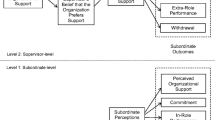Abstract
This study examines the relationship between supervisory justice and trust in supervisor and their impacts on extra-role performance. Drawing on fairness heuristic theory, we hypothesize that supervisory interactional justice will significantly affect the two domains of trust in supervisor, namely, reliance and disclosure, which in turn enhance subordinate extra-role performance. We also predict that supervisory procedural justice will moderate the relationship between supervisory interactional justice and trust in supervisor. We test our hypotheses using a sample of 111 insurance agent-manager dyads. The results show that although supervisory interactional justice is positively related to both reliance and disclosure, only disclosure mediates its effect on extra-role performance. In addition, supervisory procedural justice moderates the impact of supervisory interactional justice on reliance but not disclosure. The implications for research on justice and trust are discussed.

Similar content being viewed by others
References
Adair, S. L. 1999. Supervisor self-disclosure as a predictor of supervisee self-disclosure, satisfaction with supervision, and perceptions of supervisor credibility. Unpublished doctoral dissertation, University of Southern California, Los Angeles, California.
Aiken, L. S., & West, S. G. 1991. Multiple regression: Testing and interpreting interactions. Newbury Park, CA: Sage Publications.
Altman, I., & Taylor, D. A. 1973. Social penetration: The development of interpersonal relationships, 1st Irvington ed. New York: Irvington Publishers, Inc.
Ambrose, M. L., & Schminke, M. 2003. Organization structure as a moderator of the relationship between procedural justice, interactional justice, perceived organizational support, and supervisory trust. Journal of Applied Psychology, 88: 295–305.
Aryee, S., Budhwar, P. S., & Chen, Z. X. 2002. Trust as a mediator of the relationship between organizational justice and work outcomes: Test of a social exchange model. Journal of Organizational Behavior, 23: 267–285.
Baron, R. M., & Kenny, D. A. 1986. The moderator-mediator variable distinction in social psychological research: Conceptual, strategic, and statistical considerations. Journal of Personality and Social Psychology, 51: 1173–1182.
Baumeister, R. F., & Leary, M. R. 1995. The need to belong: Desire for interpersonal attachments as a fundamental human motivation. Psychological Bulletin, 117: 497–529.
Bies, R. J. 2001. Interactional (in)justice: The sacred and the profane. In J. Greenberg & R. Cropanzano (Eds.). Advances in organizational justice: 89–118. Stanford, CA: Stanford University Press.
Bies, R. J. 2005. Are procedural justice and interactional justice conceptually distinct? In J. Greenberg & J. A. Colquitt (Eds.). Handbook of organizational justice: 85–112. Mahwah, NJ: Erlbaum.
Brockner, J., & Wiesenfeld, B. M. 1996. An integrative framework for explaining reactions to decisions: Interactive effects of outcomes and procedures. Psychological Bulletin, 120: 189–208.
Brooke, P. P., Russell, D. W., & Price, J. L. 1988. Discriminant validation of measures of job satisfaction, job involvement, and organizational commitment. Journal of Applied Psychology, 73: 139–145.
Burke, C. S., Sims, D. E., Lazzara, E. H., & Salas, E. 2007. Trust in leadership: A multi-level review and integration. Leadership Quarterly, 18: 606–632.
Burnard, P., & Morrison, P. 1992. Self-disclosure: A contemporary analysis. Aldershot, UK: Avebury.
Byrne, Z. S. 1999. How do procedural and interactional justice influence multiple levels of organizational outcomes? Paper presented at the Annual meeting of the Society for Industrial and Organizational Psychology, Atlanta, GA.
Choi, J. 2008. Event justice perceptions and employees’ reactions: Perceptions of social entity justice as a moderator. Journal of Applied Psychology, 93: 513–528.
Collins, N. L., & Miller, L. C. 1994. Self-disclosure and liking: A meta-analytic review. Psychological Bulletin, 3: 457–475.
Colquitt, J. A. 2001. On the dimensionality of organizational justice: A construct validation of a measure. Journal of Applied Psychology, 86: 386–400.
Colquitt, J. A., Conlon, D. E., Wesson, M. J., Porter, C. O. L. H., & Ng, K. Y. 2001. Justice at the millennium: A meta-analytic review of 25 years of organizational justice research. Journal of Applied Psychology, 86: 425–445.
Colquitt, J. A., Greenberg, J., & Scott, B. A. 2005. Organizational justice: Where do we stand? In J. Greenberg & J. A. Colquitt (Eds.). Handbook of organizational justice: 589–619. Mahwah, NJ: Erlbaum.
Colquitt, J. A., Scott, B. A., & LePine, J. A. 2007. Trust, trustworthiness, and trust propensity: A meta-analytic test of their unique relationships with risk taking and job performance. Journal of Applied Psychology, 92: 909–927.
Cropanzano, R., Prehar, C. A., & Chen, P. Y. 2002. Using social exchange theory to distinguish procedural from interactional justice. Group and Organization Management, 27: 324–351.
Denison, D. R., & Mishra, A. K. 1995. Toward a theory of organizational culture and effectiveness. Organization Science, 6: 204–223.
Derlega, V. J., Metts, S., Petronio, S., & Margulis, S. T. 1993. Self-disclosure. Newbury Park, CA: Sage Publications.
Dirks, K. T. 2000. Trust in leadership and team performance: Evidence from NCAA basketball. Journal of Applied Psychology, 85: 1004–1012.
Dirks, K. T., & Ferrin, D. L. 2002. Trust in leadership: Meta-analytic findings and implications for research and practice. Journal of Applied Psychology, 87: 611–628.
Folger, R., & Konovsky, M. A. 1989. Effects of procedural and distributive justice on reaction to pay raise decisions. Academy of Management Journal, 32: 115–130.
Gillespie, N. 2003. Measuring trust in working relationships: The behavioral trust inventory. Paper presented at the Academy of Management Conference, Seattle, WA.
Gillespie, N., & Mann, L. 2004. Transformational leadership and shared values: The building blocks of trust. Journal of Managerial Psychology, 19: 588–607.
Hu, L., & Bentler, P. M. 1998. Fit indices in covariance structure modeling: Sensitivity to underparameterized model misspecification. Psychological Methods, 3: 424–453.
Hui, C., Law, K. S., & Chen, Z. X. 1999. A structural equation model of the effects of negative affectivity, leader-member exchange, and perceived job mobility on in-role and extra-role performance: A Chinese case. Organizational Behavior & Human Decision Processes, 77: 3–21.
Judge, T. A., Scott, B. A., & Ilies, R. 2006. Hostility, job attitudes, and workplace deviance: Test of a multilevel model. Journal of Applied Psychology, 91: 126–138.
Karriker, J. H., & Williams, M. L. 2009. Organizational justice and organizational citizenship behavior: A mediated multifoci model. Journal of Management, 35: 112–135.
Konovsky, M. A., & Pugh, S. D. 1994. Citizenship behavior and social exchange. Academy of Management Journal, 37: 656–669.
Korsgaard, M. A., Brodt, S. E., & Whitener, E. M. 2002. Trust in the face of conflict: The role of managerial trustworthy behavior and organizational context. Journal of Applied Psychology, 87: 312–319.
Korsgaard, M. A., Schweiger, D. M., & Sapienza, H. J. 1995. Building commitment, attachment, and trust in strategic decision-making teams—The role of procedural justice. Academy of Management Journal, 38: 60–84.
Kramer, R. M. 2001. Identity and trust in organizations: One anatomy of a productive but problematic relationship. In M. A. Hogg & D. J. Terry (Eds.). Social identity processes in organizational contexts: 167–180. Philadelphia, PA: Psychology Press.
Lam, L. W., & Lau, D. 2008. Work climate and customer satisfaction: The role of trust in the retail context. Journal of Management and Organization, 14: 141-154.
Lau, D., & Lam, L. W. 2008. Effects of trust and being trusted on team citizenship behavior in chain stores. Asian Journal of Social Psychology, 11: 141–149.
Lau, D., Lam, L. W., & Salamon, S. B. 2008. The impact of relational demographics on perceived managerial trustworthiness: Similarity or norms. Journal of Social Psychology, 148: 187-208.
Lewicki, R. J., Wiethoff, C., & Tomlinson, E. C. 2005. What is the role of trust in organizational justice? In J. Greenberg & J. A. Colquitt (Eds.). Handbook of organizational justice: 247–270. Mahwah, NJ: Erlbaum.
Liao, H., & Rupp, D. E. 2005. The impact of justice climate and justice orientation on work outcomes: A cross-level multifoci framework. Journal of Applied Psychology, 90: 242–256.
Lind, E. A. 2001. Fairness heuristic theory: Justice judgments as pivotal cognitions in organizational relations. In J. Greenberg & R. Cropanzano (Eds.). Advances in organizational justice: 56–88. Stanford, CA: Stanford University Press.
Loi, R., Yang, J., & Diefendorff, J. M. 2009. Four-factor justice and daily job satisfaction: A multilevel investigation. Journal of Applied Psychology, 94: 770–781.
Mael, F., & Ashforth, B. E. 1992. Alumni and their alma mater: A partial test of the reformulated model of organizational identification. Journal of Organizational Behavior, 13: 103–123.
Mathieu, J. E., & Farr, J. L. 1991. Further evidence for the discriminant validity of measures of organizational commitment, job involvement, and job satisfaction. Journal of Applied Psychology, 76: 127–133.
Mayer, R. C., Davis, J. H., & Schoorman, F. D. 1995. An integrative model of organizational trust. Academy of Management Review, 20: 709–734.
Mayer, R. C., & Gavin, M. B. 2005. Trust in management and performance: Who minds the shop while the employees watch the boss?. Academy of Management Journal, 48: 874–888.
Mikula, G., Petri, B., & Tanzer, N. 1990. What people regard as unjust: Types and structures of everyday experiences of injustice. European Journal of Social Psychology, 20: 133–149.
Olkkonen, M., & Lipponen, J. 2006. Relationships between organizational justice, identification with organization and work unit, and group-related outcomes. Organizational Behavior and Human Decision Processes, 100: 202–215.
Ouchi, W. G. 1981. Theory Z: How American business can meet the Japanese challenge. Reading, MA: Addison-Wesley.
Patterson, M. G., West, M. A., Shackleton, V. J., Dawson, J. F., Lawthom, R., Maitlis, S., Robinson, D. L., & Wallace, A. M. 2005. Validating the organizational climate measure: Links to managerial practices, productivity and innovation. Journal of Organizational Behavior, 26: 379–408.
Pazy, A., & Ganzach, Y. 2009. Pay contingency and the effects of perceived organizational and supervisor support on performance and commitment. Journal of Management, 35: 1007–1025.
Pearce, J. L., & Gregersen, H. B. 1991. Task interdependence and extrarole behavior: A test of the mediating effects of felt responsibility. Journal of Applied Psychology, 76: 838–844.
Podsakoff, P. M., MacKenzie, S. B., Paine, J. B., & Bachrach, D. G. 2000. Organizational citizenship behaviors: A critical review of the theoretical and empirical literature and suggestions for future research. Journal of Management, 26: 513–563.
Pruitt, D. G., & Carnevale, P. J. 1993. Negotiation in social conflict. Pacific Grove, CA: Cole Publishing Company.
Robinson, S. L. 1996. Trust and breach of the psychological contract. Administrative Science Quarterly, 41: 574–599.
Rousseau, D., Sitkin, S., Burt, R., & Camerer, C. 1998. Not so different after all: A cross–discipline view of trust. Academy of Management Review, 23: 393–404.
Rupp, D. E., & Cropanzano, R. 2002. The mediating effects of social exchange relationships in predicting workplace outcomes from multifoci organizational justice. Organizational Behavior and Human Decision Processes, 89: 925–946.
Schoorman, F. D., Mayer, R. C., & Davis, J. H. 2007. An integrative model of organizational trust: Past, present, and future. Academy of Management Review, 32: 344–354.
Simons, T., & Roberson, Q. 2003. Why managers should care about fairness: The effects of aggregate justice perceptions on organizational outcomes. Journal of Applied Psychology, 88: 432–443.
van den Bos, K., Lind, E. A., & Wilke, H. A. M. 2001. The psychology of procedural and distributive justice viewed from the perspective of fairness heuristic theory. In R. Cropanzano (Ed.). Justice in the workplace: Vol. 2. From theory to practice: 49–66. Mahwah, NJ: Erlbaum.
van den Bos, K., Vermunt, R., & Wilke, H. A. M. 1997. Procedural and distributive justice: What is fair depends more on what comes first than on what comes next. Journal of Personality and Social Psychology, 72: 95–104.
van Knippenberg, D., & Sleebos, E. 2006. Organizational identification versus organizational commitment: Self-definition, social exchange, and job attitudes. Journal of Organizational Behavior, 27: 571–584.
Williams, K. D. 2007. Ostracism. Annual Review of Psychology, 58: 425–452.
Wong, Y. T., Ngo, H. Y., & Wong, C. S. 2006. Perceived organizational justice, trust, and OCB: A study of Chinese workers in joint ventures and state-owned enterprises. Journal of World Business, 41: 344–355.
Author information
Authors and Affiliations
Corresponding author
Rights and permissions
About this article
Cite this article
Lam, L.W., Loi, R. & Leong, C. Reliance and disclosure: How supervisory justice affects trust in supervisor and extra-role performance. Asia Pac J Manag 30, 231–249 (2013). https://doi.org/10.1007/s10490-011-9249-5
Published:
Issue Date:
DOI: https://doi.org/10.1007/s10490-011-9249-5




